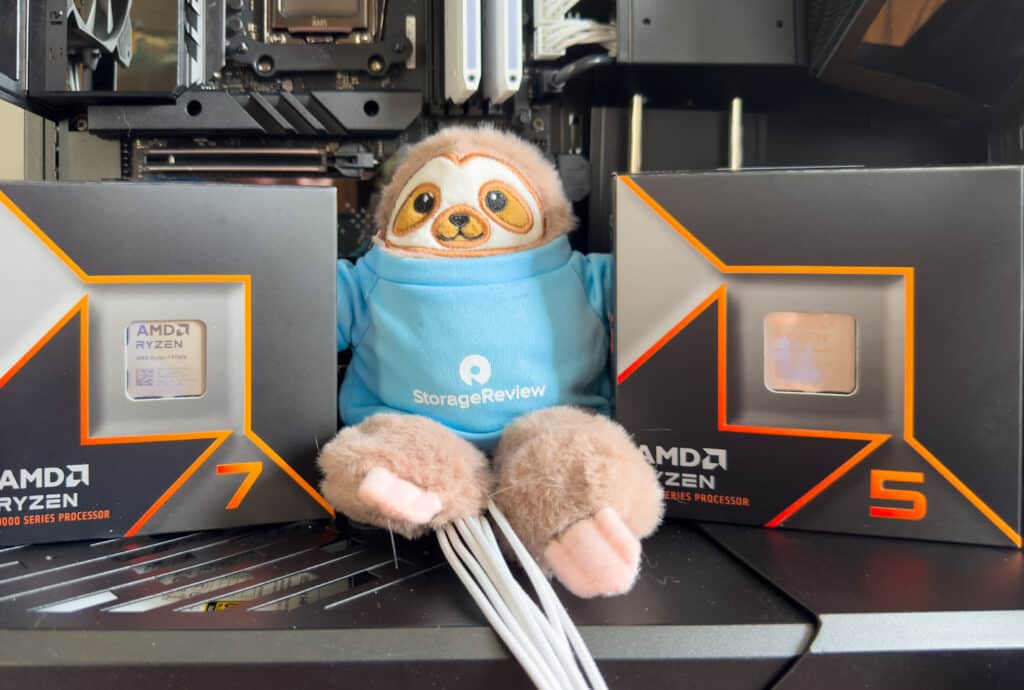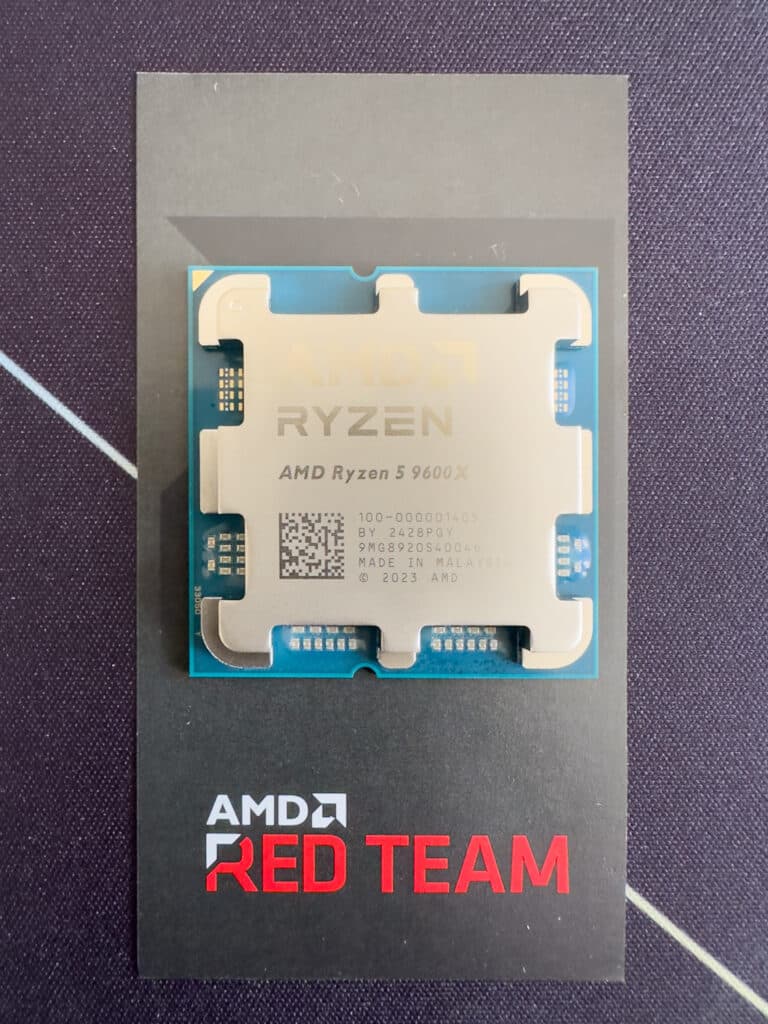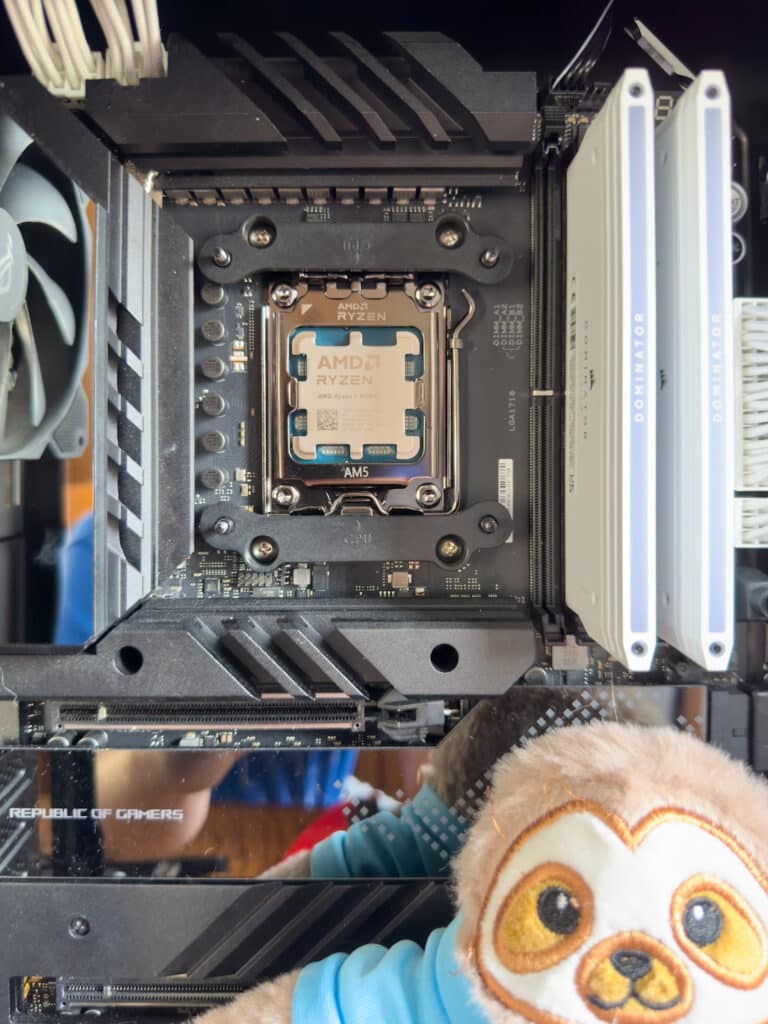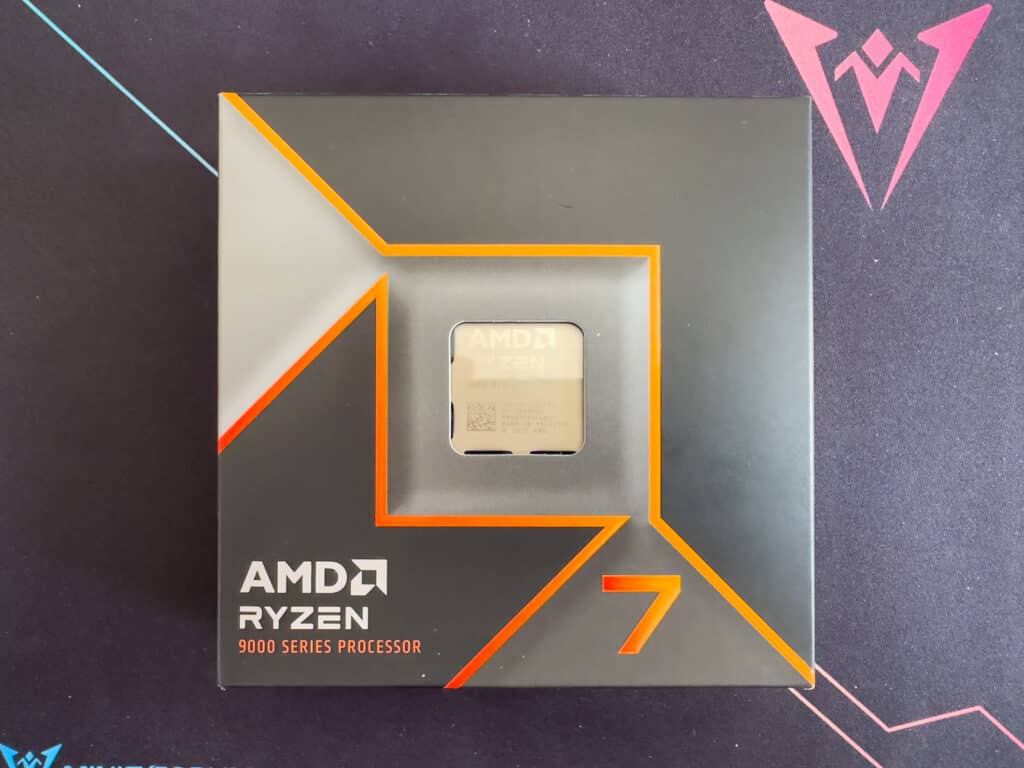As Zen 5 enters the market with AMD Ryzen 7 9700X and Ryzen 5 9600X CPUs, it’s clear there are serious performance gains.
Over the years AMD has consistently delivered groundbreaking advancements that set new industry standards. The latest in their lineup, the AMD Ryzen 9700X and 9600X CPUs, powered by the cutting-edge Zen 5 architecture, are no exception. These processors are engineered to provide unparalleled performance, enhanced energy efficiency, and exceptional scalability, making them a formidable choice for both enthusiasts and professionals.
Ground Up Design
The AMD Zen 5 architecture is a significant leap forward in CPU design for AMD, building on the strengths of its predecessors while incorporating innovative features to meet the demands of modern computing. Zen 5 emphasizes performance improvements, particularly in single-thread (1T) and two-thread (2T) operations. This is achieved through a combination of architectural refinements and the introduction of the AVX512 instruction set on a 512-bit datapath, which boosts throughput and enhances AI performance. The design objectives of Zen 5 include delivering higher performance and ensuring energy efficiency and scalability across different manufacturing processes, specifically 4nm and 3nm nodes.
Zen 5 features an advanced branch predictor that reduces pipeline stalls and enhances instruction fetch efficiency. The architecture includes a larger L1 Branch Target Buffer (BTB) and a more substantial return address stack, contributing to more accurate branch predictions and better handling of instruction streams. The instruction cache (I-Cache) and operation cache (Op-Cache) have also been upgraded, with the I-Cache now offering 32KB of storage with 8-way associativity and the Op-Cache supporting up to 6K instructions with dual 6-wide fetch pipelines. These improvements are designed to handle higher instruction throughput and reduce latency.
Another significant area of advancement in Zen 5 is its integer and floating-point execution units. The architecture supports an 8-wide dispatch, rename, and retire pipeline, enhancing the parallel execution of instructions. This means Zen 5 can handle more tasks simultaneously, making it faster and more efficient for everyday computing and complex workloads.
The integer unit includes six arithmetic logic units (ALUs) and four address generation units (AGUs), capable of handling four memory operations per cycle. The floating-point unit (FPU) is equally robust, featuring six operations per cycle and full support for 512-bit AVX512 instructions. This increases computational power and efficiency, particularly for workloads that rely heavily on floating-point calculations.
Zen 5’s memory subsystem has also been overhauled to provide higher bandwidth and lower latency. The L1 data cache (D-Cache) has been expanded to 48KB with 12-way associativity, supporting up to four memory operations per cycle. The L2 cache per core has also been improved, with a 1MB capacity and 16-way associativity, doubling the bandwidth compared to Zen 4. These enhancements mean faster data access and better overall performance in memory-intensive applications. Additionally, the architecture introduces a new 2D stride prefetcher, which improves data prefetching efficiency and enhances workload pattern recognition.
The Zen 5 architecture is designed to support a variety of configurations, including the compact Zen 5c variant optimized for scalability and power efficiency. Both variants share the same instruction per cycle (IPC) capabilities but differ in their maximum frequency targets and L3 cache sizes. This flexible approach allows AMD to cater to different market needs, from high-performance computing to power-efficient applications. With its comprehensive features and performance enhancements, Zen 5 sets a new benchmark for CPU design, promising significant improvements in general-purpose and specialized computing tasks.
The company has also introduced the AMD XDNA 2 architecture, which includes a second-generation AI engine. Integrated into the Ryzen AI and XDNA 2, this AI engine is designed to deliver enhanced AI processing capabilities across a wide range of applications. The XDNA 2 architecture supports advanced features such as increased on-chip memory, improved power efficiency, and broad AI model support. It boasts up to 50 INT8 TOPS and 50 Block FP16 TFLOPS, significantly improving performance over the previous generation.
Performance
Test Configuration
Our AMD Ryzen 9700X and 9600X CPUs testing rig is equipped with high-end components to ensure optimal performance. We are comparing these CPUs to Zen 4 processors, specifically the Ryzen 7 5700X3D and 8700G, to highlight the differences between the two generations of Zen architecture. Each CPU was swapped into the same setup and subjected to rigorous benchmarking.
The specifications for our testing platform included:
- Motherboard: ASUS ROG CROSSHAIR X670E HERO
- Cooler: ASUS ROG RYUJIN III 360 AIO Cooler
- Memory: Corsair Dominator Titanium DDR5 @ DOCP 6000
- Storage: Kioxia XG8 M.2 2TB NVMe
- GPU: XFX Radeon 7900 GRE
The ASUS ROG CROSSHAIR X670E HERO motherboard is ideal for benchmarking Zen 5 CPUs due to its robust 18+2 phase VRM configuration, which ensures stable power delivery. We used the ASUS ROG RYUJIN III 360 AIO Cooler, which provides excellent thermal management, crucial for maintaining peak performance during intensive tasks. The Corsair Dominator Titanium DDR5 memory runs at DOCP 6000, offering high-speed, low-latency performance essential for both gaming and professional applications.
Storage is handled by the Kioxia XG8 M.2 2TB NVMe SSD, which is quoted with sequential read speeds of up to 7,000 MB/s and sequential write speeds of up to 5,800 MB/s. The graphics performance is powered by the XFX Radeon RX 7900 GRE, featuring 16GB of GDDR6 memory, a 256-bit memory interface, and boost clock speeds up to 2395 MHz. This GPU supports advanced technologies like AMD FidelityFX and the AMD Radiance Display Engine.
AMD Zen 5 Benchmark Results
3DMark CPU Profile
The 3DMark CPU Profile benchmarking tool is tailored to gauge CPU performance through a series of custom simulations. This benchmark includes six tests, each employing the same workload but with varying threading capacity. These tests are meticulously designed to challenge the CPU across different threading levels — 1, 2, 4, 8, 16, and up to the maximum available threads of a given system.
The benchmarking results show that the AMD Ryzen 7 9700X (Zen 5) outperforms its Zen 4 counterparts and the Ryzen 5 9600X (Zen 5) across all thread counts. Notably, the 9700X achieves the highest scores with 8,845 in the Max Threads test and 8,854 in the 16 Threads test, indicating significant improvements in multi-threaded performance over the Ryzen 7 5700X3D and Ryzen 7 8700G (Zen 4). The Ryzen 5 9600X also demonstrated strong performance, particularly against the Zen 4 CPUs, but expectedly lagged behind the 9700X, highlighting the advantages of higher core and thread counts in the Zen 5 architecture.
| 3DMARK CPU Profile | AMD Ryzen 7 9700X (Zen 5, 8c, 16t) | AMD Ryzen 5 9600X (Zen 5, 6c, 12t) |
AMD Ryzen 7 5700X3D (Zen 3, 8c, 16t) | AMD Ryzen 7 8700G (Zen 4, 8c, 16t) |
| Max Threads | 8,845 | 7,374 | 8,256 | 6,935 |
| 16 Threads | 8,854 | 7,390 | 8,244 | 6,941 |
| 8 Threads | 7,952 | 6,876 | 7,002 | 5,960 |
| 4 Threads | 4,881 | 4,758 | 3,878 | 3,164 |
| 2 Threads | 2,550 | 2,484 | 2,066 | 1,628 |
| 1 Thread | 1,286 | 1,264 | 1,044 | 826 |
3DMark GPU Tests
3DMark Night Raid is a DirectX 12 benchmark tailored for devices with internal graphics, while Fire Strike is a DirectX 11 benchmark designed for gaming PCs. Fire Strike includes two graphics tests, one physics test, and a combined test for the CPU and GPU simultaneously.
| 3DMark Test | AMD Ryzen 7 9700X (Zen 5, 8c, 16t) |
AMD Ryzen 5 9600X (Zen 5, 6c, 12t) |
AMD Ryzen 7 8700G (Zen 4, 8c, 16t) |
AMD Ryzen 7 5700X3D (Zen 3, 8c, 16t) |
| Fire Strike Ultra | 14,812 | 14,666 | N/A | 14,468 |
| Fire Strike | N/A | N/A | 7,856 | N/A |
| Night Raid | N/A | N/A | 30,779 | N/A |
| Speed Way | 4,465 | 4,469 | N/A | 4,449 |
| Time Spy Extreme | 9,900 | 9,369 | N/A | 9,256 |
| Steel Nomad | 4,921 | 4,917 | N/A | N/A |
Geekbench 6
The Geekbench 6 cross-platform benchmark measures a system’s performance and provides a comparison score. It is designed to work on multiple platforms and provides a consistent performance measurement across many devices, from smartphones and tablets to desktops and servers.
The Zen 5 CPUs exhibited significant performance improvements over the Zen 4 CPUs. The AMD Ryzen 7 9700X (Zen 5) achieved a single-core score of 3,430 and a multi-core score of 17,096, surpassing the Ryzen 7 8700G (Zen 4), which scored 2,663 in single-core tests. The Ryzen 5 9600X (Zen 5) also showed strong performance with a single-core score of 3,326 and a multi-core score of 14,798.
| Geekbench 6 | AMD Ryzen 7 9700X (Zen 5, 8c, 16t) |
AMD Ryzen 5 9600X (Zen 5, 6c, 12t) |
AMD Ryzen 7 8700G (Zen 4, 8c, 16t) |
AMD Ryzen 7 5700X3D (Zen 3, 8c, 16t) |
| Single Core | 3,430 | 3,326 | 2,663 | N/A |
| Multi-Core | 17,096 | 14,798 | N/A | N/A |
Maxon Cinebench
Cinebench is a widely used benchmarking tool that measures the performance of CPUs and GPUs using Maxon Cinema 4D for rendering. It provides a score that can compare the performance of different systems and components. We ran four popular versions of Cinebench so you can compare the results on popular leaderboards online.
In the Cinebench tests, the Zen 5 CPUs consistently outperformed their Zen 4 counterparts. The AMD Ryzen 7 9700X (Zen 5) scored 19,884 points in Cinebench R23 multi-core and 2,206 points in single-core tests, significantly surpassing the Ryzen 7 8700G (Zen 4) which scored 17,535 and 1,829 points respectively. The Ryzen 5 9600X (Zen 5) also demonstrated strong performance with 16,384 points in multi-core and 2,184 points in single-core tests. In Cinebench R20, the 9700X led with 7,786 points, well ahead of the Zen 4 5700X3D’s 5,372 points. Similarly, in Cinebench R15, the 9700X achieved 3,111 cb, outstripping the 5700X3D’s 2,351 cb.
Finally, in Cinebench 2024, the 9700X scored 1,178 in multi-core and 137 in single-core tests, showcasing the Zen 5 architecture’s superior performance across all metrics.
In real-world applications, upgrading to the Zen 5 CPUs means better performance in multi-threaded and single-threaded tasks, translating to smoother and faster performance in demanding applications like 3D rendering, video editing, and other content creation tasks.
| Test | AMD Ryzen 7 9700X (Zen 5, 8c, 16t) |
AMD Ryzen 5 9600X (Zen 5, 6c, 12t) |
AMD Ryzen 7 8700G (Zen 4, 8c, 16t) |
AMD Ryzen 7 5700X3D (Zen 3, 8c, 16t) | |
| Cinebench R23 | |||||
| CPU (Multi Core) | 19,884 pts | 16,384 pts | 17,535 pts | 13,897 pts | |
| CPU (Single Core) | 2,206 pts | 2,184 pts | 1,829 pts | N/A | |
| MP Ratio | 9.01 x | 7.50 x | 9.59 x | N/A | |
| Cinebench R20 | |||||
| CPU | 7,786 pts | 6,413 pts | 6,882 pts | 5,372 pts | |
| Cinebench R15 | |||||
| CPU | 3,111 cb | 2,561 cb | 2,836 cb | 2,351 cb | |
| Cinebench 2024 | |||||
| CPU (Multi Core) | 1,178 pts | N/A | 987 pts | 789 pts | |
| CPU (Single Core) | 137 pts | N/A | 109 pts | 86 pts | |
| MP Ratio | 8.60 x | N/A | 9.05 x | 9.17 x | |
y-cruncher
y-cruncher 0.8.3.9522 is a multi-threaded, scalable program that can compute Pi and other mathematical constants to trillions of digits. Since its launch in 2009, it has become a popular benchmarking and stress-testing application for overclockers and hardware enthusiasts.
The y-cruncher benchmark results illustrate the Zen 5 CPUs significantly outperform the Zen 4 CPUs in total computation time across all tested values. The AMD Ryzen 7 9700X (Zen 5) completed the 1-billion-digit calculation in 21.658 seconds, notably faster than the Ryzen 7 8700G (Zen 4) at 26.376 seconds and the Ryzen 7 5700X3D (Zen 3) at 36.819 seconds. The Ryzen 5 9600X (Zen 5) also demonstrated strong performance, completing the same calculation in 24.945 seconds.
For the 2.5-billion-digit test, the 9700X finished in 62.456 seconds, outpacing the 8700 G’s 79.157 seconds, the 5700X3D’s 107.360 seconds, and the 9600X’s 74.920 seconds. In the 5-billion-digit calculation, the 9700X led with a time of 132.758 seconds, compared to the 8700 G’s 172.172 seconds, the 5700X3D’s 242.147 seconds, and the 9600X’s 163.732 seconds. These results indicate that Zen5 CPUs handle heavy computational tasks more efficiently, making them a better choice for users requiring high performance in scientific calculations and other processor-intensive applications.
| y-cruncher Total Computation Time (Lower is Better) |
AMD Ryzen 7 9700X (Zen 5, 8c, 16t) |
AMD Ryzen 5 9600X (Zen 5, 6c, 12t) |
AMD Ryzen 7 8700G (Zen 4, 8c, 16t) |
AMD Ryzen 7 5700X3D (Zen 3, 8c, 16t) |
| 1 Billion | 21.658s | 24.945s | 26.376s | 36.819s |
| 2.5 Billion | 62.456s | 74.920s | 79.157s | 107.360s |
| 5 Billion | 132.758s | 163.732s | 172.172s | 242.147s |
y-cruncher BBP
This y-cruncher benchmark utilizes the Bailey-Borwein-Plouffe (BBP) formulas to compute massive hexadecimal digits of Pi, measuring the CPU’s total computation time, utilization, and multi-core efficiency. The results provide a detailed performance analysis of the AMD Ryzen 7 9700X CPU under these intensive calculations.
| Benchmark | AMD Ryzen 7 9700X (Zen 5, 8c, 16t) |
AMD Ryzen 5 9600X (Zen 5, 6c, 12t) |
AMD Ryzen 7 8700G (Zen 4, 8c, 16t) |
AMD Ryzen 7 5700X3D (Zen 3, 8c, 16t) |
| 1 BBP | Total Time: 0.865 secondsCPU Utilization: 1332.81%Multi-core Efficiency: 83.30% |
Total Time: 1.008 secondsCPU Utilization: 1018.20%Multi-core Efficiency: 84.85% |
N/A | Total Time: 1.946 seconds
CPU Utilization: 1523.06% Multi-core Efficiency: 95.19% |
| 10 BBP | Total Time: 9.552 secondsCPU Utilization: 1578.20%Multi-core Efficiency: 98.64% |
Total Time: 11.215 seconds
CPU Utilization: 1182.67% Multi-core Efficiency: 98.56% |
N/A | Total Time: 21.554 seconds
CPU Utilization: 1588.88% Multi-core Efficiency: 99.31% |
| 100 BBP | Total Time: 105.559 seconds
CPU Utilization: 1593.16% Multi-core Efficiency: 99.57% |
Total Time: 123.582 seconds
CPU Utilization: 1196.03% Multi-core Efficiency: 99.67% |
N/A | Total Time: 240.543 seconds
CPU Utilization: 1596.35% Multi-core Efficiency: 99.77% |
7Zip Compression Benchmark
The built-in memory benchmark in the 7-Zip utility measures the performance of a system’s CPU and memory during compression and decompression tasks, indicating how well the system can handle data-intensive operations. We run this test at a 128MB dictionary size when possible.
As the table below reveals, the AMD Ryzen 7 9700X (Zen 5) and Ryzen 5 9600X (Zen 5) show strong performance compared to the Zen 4 CPUs. The Ryzen 7 9700X achieved a current rating of 22.369 GIPS and a resulting rating of 119.694 GIPS during compression, outperforming the Ryzen 7 8700G (15.803 GIPS current, 85.766 GIPS resulting) and the Ryzen 7 5700X3D (8.651 GIPS current, 69.965 GIPS resulting). The Ryzen 5 9600X also performed well, with a current rating of 26.461 GIPS and a resulting rating of 97.146 GIPS.
During decompression, the Ryzen 7 9700X led again with a current rating of 130.245 GIPS and a resulting rating of 130.281 GIPS, significantly better than the Ryzen 7 8700G (116.835 GIPS current, 116.640 GIPS resulting) and the Ryzen 7 5700X3D (101.553 GIPS current, 100.861 GIPS resulting). These results indicate that Zen 5 CPUs offer superior performance in data-intensive tasks, making them highly effective for compression and decompression operations.
| 7-Zip Compression Benchmark (Higher is better) |
AMD Ryzen 7 9700X (Zen 5, 8c, 16t) | AMD Ryzen 5 9600X (Zen 5, 6c, 12t) | AMD Ryzen 7 8700G (Zen 4, 8c, 16t) | AMD Ryzen 7 5700X3D (Zen 3, 8c, 16t) |
| Compressing | ||||
| Current CPU Usage | 534% | 368% | 548% | 811% |
| Current Rating / Usage | 22.369 GIPS | 26.461 GIPS | 15.803 GIPS | 8.651 |
| Current Rating | 119.355 GIPS | 97.375 GIPS | 86.574 GIPS | 70.151 GIPS |
| Resulting CPU Usage | 541% | 407% | 536% | 820% |
| Resulting Rating / Usage | 22.201 GIPS | 24.057 GIPS | 16.003 GIPS | 8.529 GIPS |
| Resulting Rating | 119.694 GIPS | 97.146 GIPS | 85.766 GIPS | 69.965 GIPS |
| Decompressing | ||||
| Current CPU Usage | 1571% | 1190% | 1576% | 1587% |
| Current Rating / Usage | 8.290 GIPS | 8.736 GIPS | 7.413 GIPS | 6.398% |
| Current Rating | 130.245 GIPS | 103.977 GIPS | 116.835 GIPS | 101.553% |
| Resulting CPU Usage | 1570% | 1186% | 1581% | 1586% |
| Resulting Rating / Usage | 8.296 GIPS | 8.765 GIPS | 7.375 GIPS | 6.358 GIPS |
| Resulting Rating | 130.281 GIPS | 103.924 GIPS | 116.640 GIPS | 100.861 GIPS |
| Total Rating | ||||
| Total CPU Usage | 1056% | 797% | 1059% | 1203% |
| Total Rating/Usage | 15.248 GIPS | 16.411 GIPS | 11.689 GIPS | 7.443 GIPS |
| Total Rating | 124.988 GIPS | 100.535 GIPS | 101.203 GIPS | 85.413 GIPS |
Blender OptiX
Blender OptiX is an open-source 3D modeling application. This benchmark was run using the Blender Benchmark CLI utility. The score is samples per minute, with higher being better.
The Zen 5 CPUs demonstrate superior performance compared to Zen 4 CPUs. The AMD Ryzen 7 9700X (Zen 5) achieved 126.002 samples per minute in the Monster test, significantly higher than the Ryzen 7 8700G (Zen4 ) at 111.940 and the Ryzen 7 5700X3D (Zen 4) at 87.868 (which has the same core count/threads).
The Ryzen 5 9600X (Zen 5) also performed well with 100.927 samples per minute. In the Junkshop test, the 9700X scored 92.662, outpacing the 8700 G’s 47.413 and the 5700X3D’s 62.279. The 9600X scored 73.173, maintaining strong performance.
Wrapping up, in the Classroom test, the 9700X led with 63.223 samples per minute, followed by the 8700G at 57.928 and the 5700X3D at 42.350, with the 9600X scoring 51.277. This certainly indicates that the Zen 5 CPUs provide better performance in 3D rendering tasks, making them ideal for creative professionals using Blender.
| Blender 4.0 CPU Samples Per Minute (Higher is Better) | AMD Ryzen 7 9700X (Zen 5, 8c, 16t) |
AMD Ryzen 5 9600X (Zen 5, 6c, 12t) |
AMD Ryzen 7 8700G (Zen 4, 8c, 16t) |
AMD Ryzen 7 5700X3D (Zen 3, 8c, 16t) |
| Monster | 126.002 | 100.927 | 111.94 | 87.868 |
| Junkshop | 92.662 | 73.173 | 47.413 | 62.279 |
| Classroom | 63.223 | 51.277 | 57.928 | 42.35 |
UL Procyon
UL’s Procyon AI Inference benchmark suite tests how various AI inference engines perform using state-of-the-art neural networks. We ran these tests only on the CPU. Each number is an average inference time, where lower is better with the last row providing an overall score where higher is better.
In this benchmark, the AMD Ryzen 7 9700X (Zen 5) demonstrated superior performance with faster average inference times across all tested neural networks compared to the Zen 4 CPUs. For MobileNet V3, the 9700X achieved an average inference time of 0.52ms, while the Ryzen 7 8700G (Zen 4) and Ryzen 7 5700X3D (Zen 4) recorded 1.20ms and 0.88ms respectively. In the ResNet 50 test, the 9700X completed in 5.54ms, outperforming the 8700 G’s 9.78ms and the 5700X3D’s 9.94ms.
The Ryzen 5 9600X (Zen 5) also showed strong performance, with 6.35ms for ResNet 50 and 18.47ms for Inception V4, better than both Zen 4 CPUs. The 9700X consistently had the lowest inference times, including 16.8ms for Inception V4, 25.50ms for DeepLab V3, and 41.89ms for YOLO V3, indicating superior AI inference capabilities. The 9700X’s overall score of 225 highlights its efficiency in AI tasks, making it a better choice for AI-driven applications than Zen4 CPUs, which scored 127 and 128.
| UL Procyon Average | AMD Ryzen 7 9700X (Zen 5, 8c, 16t) |
AMD Ryzen 5 9600X (Zen 5, 6c, 12t) |
AMD Ryzen 7 8700G (Zen 4, 8c, 16t) |
AMD Ryzen 7 5700X3D (Zen 3, 8c, 16t) |
| Inference Times (Lower is Better) | ||||
| MobileNet V3 | 0.52ms | 0.53ms | 1.20ms | 0.88ms |
| ResNet 50 | 5.54ms | 6.35ms | 9.78ms | 9.94ms |
| Inception V4 | 16.8ms | 18.47ms | 32.46ms | 30.88ms |
| DeepLab V3 | 25.50ms | 24.76ms | 35.66ms | 33.50ms |
| YOLO V3 | 41.89ms | 45.25ms | 74.32ms | 79.60ms |
| REAL-ESRGAN | 2,336.71ms | 2,512.66ms | 3,602.77ms | 4,931.87ms |
| Overall Score (Higher is better) |
225 | 211 | 127 | 128 |
Blackmagic RAW
The Blackmagic RAW Speed Test performance benchmarking tool is designed to measure a system’s capabilities in handling video playback and editing using the Blackmagic RAW codec. It evaluates how well a system can decode and play back high-resolution video files, providing frame rates for both CPU- and GPU-based processing.
For this benchmark test, the AMD Ryzen 7 9700X (Zen 5) demonstrated superior video playback and editing capabilities compared to Zen 4 CPUs. For 8K CPU processing, the 9700X achieved 63 FPS, outperforming the Ryzen 7 8700G (Zen 4) at 57 FPS and the Ryzen 7 5700X3D (Zen 3) at 44 FPS. The Ryzen 5 9600X (Zen 5) also performed well with 52 FPS. In 8K OPENCL processing, the 9700X led with 121 FPS, followed by the 9600X at 119 FPS, significantly higher than the 8700 G’s 35 FPS and the 5700X3D’s 91 FPS.
The Zen 5 CPUs will clearly provide better performance for high-resolution video editing and playback, making them a great choice for content creators working with 4K/8K video formats.
| Blackmagic RAW (Higher is Better) |
AMD Ryzen 7 9700X (Zen 5, 8c, 16t) |
AMD Ryzen 5 9600X (Zen 5, 6c, 12t) |
AMD Ryzen 7 8700G (Zen 4, 8c, 16t) |
AMD Ryzen 7 5700X3D (Zen 3, 8c, 16t) |
| 8K CPU | 63 FPS | 52 FPS | 57 FPS | 44 FPS |
| 8K OPENCL | 121 FPS | 119 FPS | 35 FPS | 91 FPS |
Closing Thoughts
As Zen 5 begins to enter the market with the AMD Ryzen 7 9700X and Ryzen 5 9600X, it’s clear that there are serious performance gains with the new architecture. While these two samples are single CCD CPUs, the improvements in the pipeline and instruction sets shine through in the benchmarks compared to the previous generation.
While you may not need to run out and upgrade your current AM5 Socket CPU, the value of the R7 9700X at $359 (USD) and R5 9600X at $279 (USD) starts to become more compelling for those who may still be hanging on to an AM4 platform, justifying the leap to an AM5 motherboard.
Ryzen CPUs at Amazon (affiliate link)
Engage with StorageReview
Newsletter | YouTube | Podcast iTunes/Spotify | Instagram | Twitter | TikTok | RSS Feed




